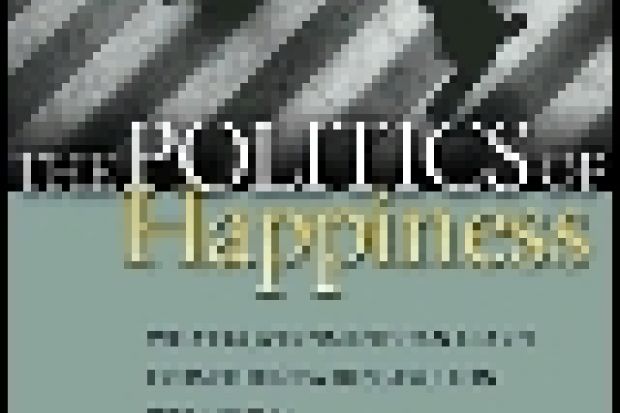Should Gross National Happiness replace Gross Domestic Product as the basic societal aspiration? If science can teach us what will really make us happy, could this herald a new epoch of agreeable and wise living? Such questions are addressed by Derek Bok in the latest of a stream of books including Authentic Happiness: Using the New Positive Psychology to Realize Your Potential for Lasting Fulfillment (2002) by Martin Seligman, and Richard Layard's Happiness: Lessons from a New Science (2005).
Bok addresses how happiness research could inform US policy. The first three chapters unpack the claims of happiness psychologists, evaluate reliability and discuss policy application. The remainder address happiness in relation to economic growth, inequality, financial hardship (retirement, healthcare and job loss), suffering (chronic pain, sleep disorder and depression), marriages and families, education and the quality of government. The debate on happiness, Bok concludes, "will be an accomplishment of enduring importance to humankind".
I confess my initial response to this latest alliance between psychology and politics mirrored the view on enlightened self-interest expressed by Fyodor Dostoevsky's narrator in Notes from Underground (1864): "Oh, you child! You sweet, innocent babe!" But Bok is no innocent babe. Born into a prominent Pennsylvania family, he is an experienced juridico-political animal and former president of Harvard University. Ditto the other happiness gurus. Layard is an Eton-educated peer and founder-director of the London School of Economics' Centre for Economic Performance. Seligman is one of the most influential US psychologists and former president of the American Psychological Association. The happiness movement, it seems, is led by an elite of positive and proactive "winners", and not by characters acquainted with the existentially fraught underworld of self-doubt that preoccupied Dostoevsky.
A key "discovery", says Bok, is that people are poor judges of what actually makes them happy. We think more cash will please us, but in fact per capita growth in income is not accompanied by comparable happiness increases. "Well-to-do liberals" think that a structurally unequal society will be less happy, but in fact happiness researchers have found that 25 years of growing inequality have not significantly affected the happiness of US citizens.
Why redistribute income more evenly when money cannot buy happiness? The wealthy will be made less happy if they lose income, while the poor will only habituate to higher incomes, doubtless retaining the "behavioural patterns" and "differences in lifestyle" that Bok implies are really causing the ills of the underground.
Such facts are partial. As Richard Wilkinson and Kate Pickett demonstrate in The Spirit Level (2009), less-equal rich countries measure poorly on practically every life-quality indicator from life expectancy to obesity levels. If "happiness" is the exception - probably because happiness self-reports are performative (stating that you are "not happy" with your marriage is not just to report a feeling state but to announce a desire for change) - why base policy on it?
To be fair, Bok does indicate some welfare policy changes that would be sensible in the US, but then, as he points out, US healthcare policy is a "spectacular failure" and they do "less than virtually any other advanced ... nation to cushion the shock of unemployment". Despite America's strikingly high levels of poverty, Bok maintains that US citizens are wrong to have a "too jaundiced view" of a government that in fact has practically no other occupation but "increasing the well-being of the citizenry".
When happiness experts tell us how "strikingly reassuring" it is to learn that wellbeing is associated with issues such as "stable democracy", "strong marriages" and "religious faith", it is wise to wonder whose happiness is really at stake. Could the apparently neutral medium of evidence-based policy be a fine hiding place for a repackaging of political normativity?
The Politics of Happiness: What Government Can Learn from the New Research on Well-being
By Derek Bok
Princeton University Press
2pp, £16.95
ISBN 9780691144894
Published 3 March 2010
Register to continue
Why register?
- Registration is free and only takes a moment
- Once registered, you can read 3 articles a month
- Sign up for our newsletter
Subscribe
Or subscribe for unlimited access to:
- Unlimited access to news, views, insights & reviews
- Digital editions
- Digital access to THE’s university and college rankings analysis
Already registered or a current subscriber? Login
